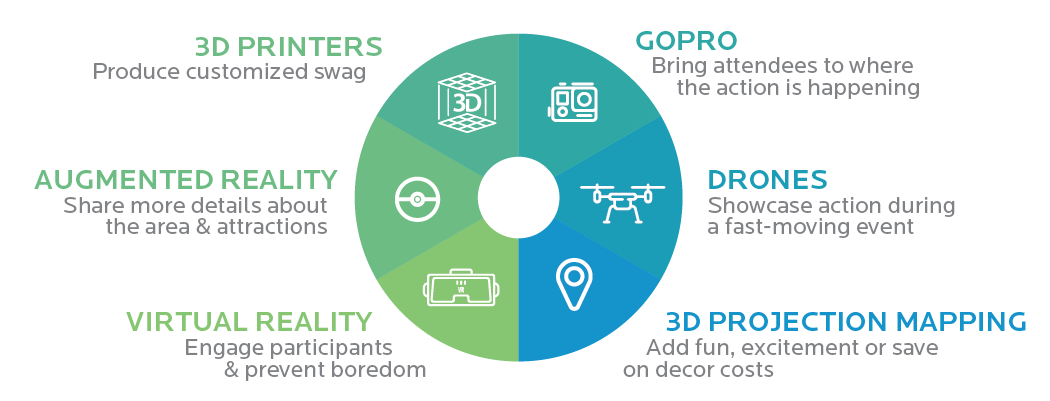8 Things to Consider When Using Event Technology
From drones and GoPro to augmented reality and 3D printers, no one could have predicted the unprecedented explosion in event technology. Given the pace of tech changes in the event space, trying to keep up-to-date can be overwhelming. How can event professionals keep up with these changes and determine the most strategic ways to incorporate technology into events?
Here are 8 keys to help you successfully integrate event technology into corporate events, meetings, conferences, and association events.
1. Monitor and track emerging trends systematically
Social media is one of the most effective ways to learn about what is hot and new.
- One way to keep up is to monitor discussions in LinkedIn Groups. Here are a few that are strictly devoted to social media and event technology:
- Follow the #eventprofs and #eventtech hashtags regularly to find articles, blog posts, and announcements about emerging technology.
- Connect with event technology suppliers at trade shows and conferences and ask them to add you to their mailing lists. Attend event start-up competitions at trade shows.
- Don’t restrict yourself to event industry shows. SXSW, GITEX and the Consumer Electronics Show (CES) are examples of great shows for picking up ideas.
- Keep abreast of trends in the music, film and fashion industries. Sometimes that is where new technology first emerges.
- Monitor trends in other parts of the world, particularly Asia and the Middle East.
This ground-breaking fashion show at the Fountain of Trevi created the illusion of the models walking on water.
2. Design a winning strategy to build support
Even if you are chomping at the bit to incorporate the hottest technology into your events (or your client’s events), senior executives may not be ready to try something new. So here’s what we suggest:
- Never just dive in. If the approach you are suggesting is brand new, it’s the worst thing you can do as you are likely to face major resistance.
- Do your homework. Determine if decision makers have been exposed to something similar.
- “Prime the pump” long before presenting your ideas. Bring in examples of what other organizations in your industry are doing.
- Share relevant articles and videos to pique interest and curiosity.
- Gather data to demonstrate ROI build the business case for trying a new approach.
- Form alliances with influencers and members of the executive team who are supportive.
- Arrange for a demo internally or by obtaining passes to an event where the technology you are proposing will be used.
3. Make sure the chosen technology supports your event objectives
Event technology is helpful only to the extent that it helps you achieve your event objectives. Here are a few examples:
4. Consider your attendees’ technology experience level
This can be as easy as adding 2 or 3 questions and quick checklists for answers to registration forms. You can ask:
- How often do you use social media? And provide spaces for Twitter, Instagram, and Snapchat handles.
- With which of the following event technology platforms are you familiar?
5. Assess demographics
It is illegal to ask about age but you can use certain questions as proxies. For example, provide checklists and ask participants:
- How much team leadership experience do you have?
- What are your favorite musical genres or groups? TV shows and movies?
Use this information to identify preferences so that you can select themes, technology, and even plan entertainment that is likely to hit the mark.
6. Select an approach that fits your event budget
If you have a high event budget, by all means, pull out all the stops. But even with a limited budget, drones, or 3D projection mapping may not be off-the-table. For a small internal event, emerging professionals or talented students may be able to deliver what you need at an affordable price.
3D projection mapping can be created for small event venues by projecting computer generated animations onto a wall or objects.
7. Avoid the “flavor of the month” trap
Even if Pokémon GO is this month’s shiny new toy, it may not be the best fit for your participants. Boomers may prefer a Pac-Man.
If you are considering gamification, provide a brief checklist and give participants an opportunity to identify whether they prefer Pokémon, Pac-Man, Space Invaders, Monopoly, or others. To gauge your attendees receptiveness to games, for years, my company has used the following true/false statements on its mini-learning styles checklists.
- Most learning games are trivial time wasters.
- Learning games appeal to me.
8. Provide coaching and support
Use tech bars, coaching corners, and breakout sessions to prepare participants to use event apps and participate in sessions that use event technology.
What’s Next?
- Curious to try out some of these event tech gadgets and see if they might be a good fit for your next event? Visit EventMobi’s hands-on interactive tech bar at Booth 549, ASAE Annual 2016. We’ll have 360° cameras, virtual reality and more!
- Get more ideas on using event gamification to influence attendee behaviour at your next event.
